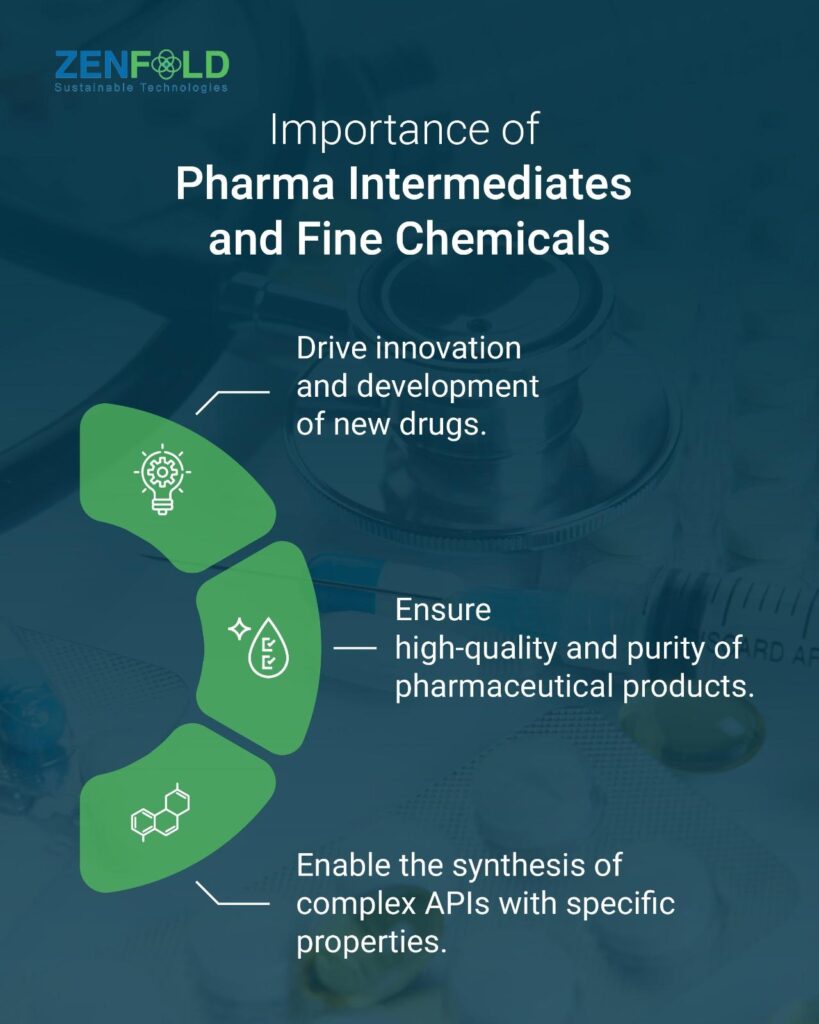-
Call us
-
Send email
Blog Details
13Jun
Pharma Intermediates and Fine Chemicals: An Explainer
by ticzenfold, 0 Comments
In the pharmaceutical industry, the production of complex drugs often requires the use of specialized chemicals known as pharma intermediates and fine chemicals. These substances play a crucial role in the synthesis and manufacturing processes, enabling the creation of high-quality pharmaceutical products. Let’s look at pharma intermediates and fine chemicals and their significance in the pharmaceutical sector.
Understanding Pharma Intermediates and Fine Chemicals
Pharma intermediates are chemical compounds used as building blocks in the synthesis of active pharmaceutical ingredients (APIs). They undergo further chemical reactions to form the desired APIs. On the other hand, fine chemicals are high-quality, pure chemical substances that possess specific properties and are used as key components in drug formulation and manufacturing processes.

Importance of Pharma Intermediates and Fine Chemicals
- Drive innovation and development of new drugs.
- Ensure high-quality and purity of pharmaceutical products.
- Enable the synthesis of complex APIs with specific properties.
Benefits of Pharma Intermediates and Fine Chemicals
- Efficiency: Pharma intermediates and fine chemicals simplify the complex synthesis processes by serving as intermediate steps.
- Purity and Quality: Fine chemicals are produced with high purity, ensuring the final pharmaceutical products meet stringent quality standards.
- Customizability: The properties of these chemicals can be tailored to meet specific drug requirements.
- Cost-effectiveness: By optimizing production processes, pharma intermediates and fine chemicals contribute to cost reductions in drug manufacturing.
Examples of Pharma Intermediates and Fine Chemicals
Examples of pharma intermediates include acetic acid, benzene, ethanol, and various functional groups such as amines, carboxylic acids, and halides. Fine chemicals encompass a broad range of substances, including solvents, reagents, catalysts, and chiral intermediates, among others. These chemicals serve as key components in the production of antibiotics, cardiovascular drugs, analgesics, antiviral agents, and more.
Use Cases of Pharma Intermediates and Fine Chemicals
- API Synthesis: Pharma intermediates play a vital role in the synthesis of APIs, contributing to the creation of diverse pharmaceutical products.
- Drug Formulation: Fine chemicals are utilized in drug formulation to enhance stability, solubility, and bioavailability, ensuring effective delivery and patient compliance.
- Process Optimization: Pharma intermediates and fine chemicals aid in optimizing manufacturing processes, improving efficiency, reducing waste, and increasing yield.
- Quality Control: Fine chemicals are used as reference standards and analytical reagents for quality control purposes, ensuring the purity and consistency of pharmaceutical products.
- Customized Drug Development: The customizability of pharma intermediates and fine chemicals allows pharmaceutical companies to develop innovative drugs tailored to specific therapeutic requirements.
- Research and Development: These chemicals support drug discovery and development efforts by providing essential building blocks and enabling the synthesis of novel compounds.
Conclusion
Pharma intermediates and fine chemicals form the backbone of pharmaceutical manufacturing, facilitating the synthesis, formulation, and quality control of a wide range of medications. Their efficient utilization enhances production processes, ensures product purity and quality, and enables customized drug development. By supporting research and development endeavors, these chemicals contribute to advancements in the pharmaceutical industry, ultimately benefiting patients worldwide with safer, more effective, and innovative medicines.
Zenfold Sustainable Technologies produces chemicals without increasing the Carbon footprint. Through green and eco-friendly manufacturing practices, Zenfold ensures sustainability.
Recent Posts
- India’s Semiconductor Industry: A Key Player in Global Supply Chains
- How India is Transforming into a Global Semiconductor Hub
- Why India is the Future of Semiconductor Sourcing
- Exploring Zenfold Sustainable Technologies’ Innovative Approaches in Chemical Manufacturing Supply Chain Management
- Reducing Carbon Footprints in Chemical Manufacturing with Green Chemistry
